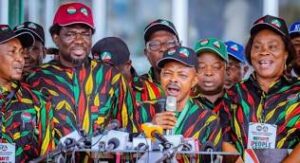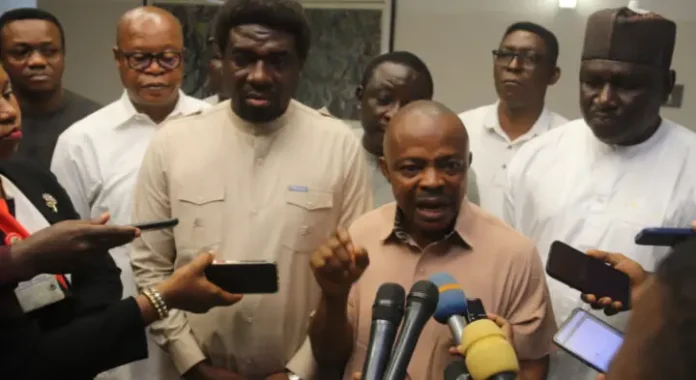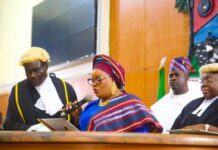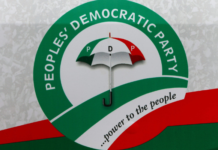The tripartite minimum wage negotiation meeting involving Organised Labour, the federal and state governments, and the Organized Private Sector, OPS, yesterday ended in deadlock, following Labour’s dismissal of the government’s N54,000 offer as expected.
Labour leaders also lamented the absence of state governors in the meeting to present their offers, as their representatives said they had no mandate.
However, we
gathered that the meeting will reconvene today by 4 pm.
According to sources, labour leaders insisted that the Federal Government has not made an offer and that it appears the government is not serious.
According to Labour, the N54,000 offer falls below the N77,000 salary its workers are earning.
Before the meeting adjourned for today, it was agreed that governors must attend to make presentations.
Confirming the development, a member of the Tripartite Committee on the National Minimum Wage, Professor Theophilus Ndubuaku, lamented the absence of six governors who represent the six geopolitical zones, stressing that it would not augur well if any agreement was reached without the governors.

Professor Ndubuaku reiterated the May 31 deadline labour had given to the government to conclude negotiations.
He said: “It took them (the government team) some time and they were passing the buck on who would present the offer. It was then the Minister of Labour who now said they had shifted ground to N54,000.
“We still told them that the ground they shifted means nothing. They have not started the negotiation because as of now, the take-home of the lowest-paid federal worker is over N77,000. By their standard, we have not started negotiating minimum wage.
“What we are negotiating now is wage reduction because what they are now telling us is that if we walk out of there if we agree on N54,000, that means we will come out and tell people who are already earning N77,000 that their wage has been reduced.
“We told them that a worker can’t start earning less than what he or she was earning. Is it that there is a reduction in inflation that the cost of living has improved, or is it that the cost of food items has come down?
“Why will they now be negotiating wage reduction? It is unthinkable. We cannot be involved in this kind of process where labour will sit down and negotiate wage reduction. On what will it be based? Will it be based on the fact that the revenue government is realising now since the petroleum subsidy was removed has been reduced?
“Or why will the government be talking about wage reduction when even the inflation is going higher and the cost of living is going higher? So, we told them it is not acceptable, but then we had to adjourn because we could not continue to negotiate without the presence of governors. It will not augur well for the tripartite committee.
Governors not at minimum wage talks
“The Federal Government’s team said it did not know why the governors were not around because six of them were sworn in as members of the committee. We told them this is a serious matter. If they refused to come, even if in the end we agreed on anything, they would say it was not binding on them because they were not there.
“There was a permanent secretary that represented one governor and the person had no input. So, nobody will decide on their (governors) behalf when they are not at the meeting. So we said let us adjourn and invite the governors formally. So, we had to adjourn to tomorrow (today) by 4 pm.”
On the reaction of organised labour when the N54,000 was offered, he said: “When they offered N54,000, we told them they have not started. We did not see that as any shifting of grounds which they promised.
“Shifting grounds must start from the point of negotiation for minimum wage. Anything below N77,000 is a wage reduction, anything below the take-home of the lowest-paid worker is a wage reduction. We cannot start negotiating wage reduction.
“Already the clock is ticking. We gave them a May 31 deadline to conclude negotiations, today (Tuesday) is May 21. We have 10 days to go and it will not augur well for this country if negotiations are not concluded on time.
“This one is no more the case if we did not agree. It is the case of the government not negotiating the minimum wage. I do not think we need any other notice (for a strike). They also said that as far as they are concerned, they are working towards the deadline so that we will conclude before we go to Geneva for the ILO.”
Recall that labour walked out of last week’s meeting after rejecting the government and the Organized Private Sector, OPS, new minimum wage proposals of N48,000 and N54, 000 respectively.
Under the umbrella of the Nigeria Labour Congress, NLC, and its Trade Union Congress of Nigeria, TUC, counterpart, Labour described the government’s proposal of a paltry N48,000 as not only insulting the sensibilities of Nigerian workers but also falling significantly short of meeting their needs and aspirations.
According to organised labour, what the government offered is a reduction in income for federal-level workers who are already receiving N30,000 as mandated by law, augmented by former President Muhammad Buhari’s 40 per cent peculiar allowance of N12,000 and the N35,000 wage award by the present government, totalling N77,000.
CDWR calls for mass action
Reacting to the development yesterday, the Campaign for Workers Democratic Right, called on labour leaders to mobilise workers for sustained mass action to actualise living wage and end all anti-people capitalists policies.
The group in a statement signed by national chairperson, Comrade Rufus Olusesan, and national publicity secretary, Comrade Chinedu Bosah, said: ‘’The Campaign for Democratic and Workers’ Rights, CDWR, calls on labour leadership not to turn this ultimatum to another empty threat like the previous one which has expired since March 13 without the NLC saying a single word, let alone a declaration of mass actions.
‘’Despite the ongoing negotiations, it is only a struggle anchored on mass mobilisation of Nigerian workers and the masses on a sustainable basis, demanding living wage and reversal of all anti-poor policies that can win reasonable concessions from an anti-people government. ‘’Therefore, after the expiration of the ultimatum, we propose a 48-hour general strike and mass protest as the first step. The struggle is going to be protracted, and so labour leaders should be prepared to sustain the mass actions through a programme of actions that allows workers to actively participate and be democratically involved.
‘’This will entail producing and circulating mass leaflets and posters, media campaigns, community mobilisation, mass meetings at workplaces and communities, and setting up community/workplace action committees to make clear that labour will wage a determined struggle to defend and improve the living standards of the vast majority of Nigerians.’’




